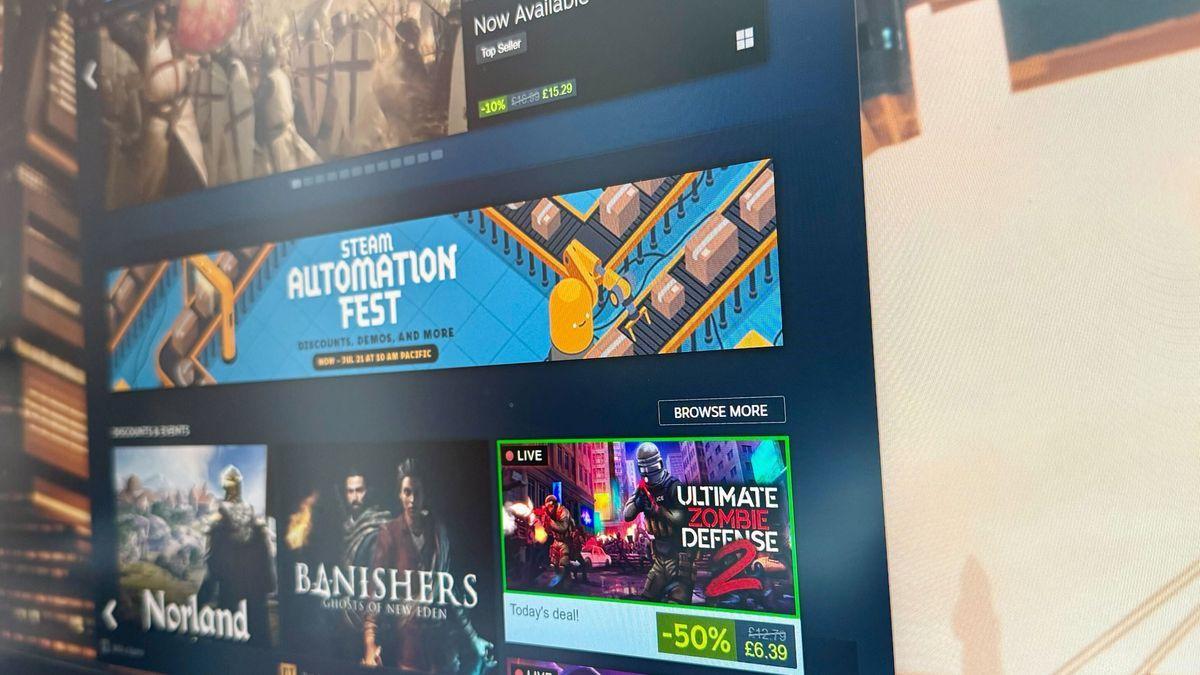AI Agents Revolutionize Game Development: 87% of Developers Already on Board
6 Sources
6 Sources
[1]
Nearly 90% of videogame developers use AI agents, Google study shows
Aug 18 (Reuters) - A Google Cloud survey showed that 87% of videogame developers are using artificial intelligence agents to streamline and automate tasks, as the industry focuses on optimizing costs following a wave of record layoffs. Most of the respondents in the report, published on Monday, said AI was helping automate cumbersome and repetitive tasks, freeing developers to focus on more creative concerns. Gaming publishers have turned to AI to deal with the industry-wide challenge of ballooning development costs and elongated creation cycles stemming from high fan expectations and intense competition. The study, conducted by Google and The Harris Poll, surveyed 615 game developers in the U.S., South Korea, Norway, Finland, and Sweden in late June and early July. Around 44% of developers use agents to optimize content and process information such as text, voice, code, audio and video rapidly, enabling them to exercise autonomy and make decisions, the study showed. But the use of AI in videogames is a highly contentious topic, with many within the industry concerned over potential job losses, intellectual property disputes and lower pay. Last year, Hollywood's videogame performers went on strike over AI and pay issues, while studios shut down and more than 10,000 people lost their jobs. The industry is expected to gain momentum this year and the next, with the launch of premium titles and new consoles seen to boost spending. According to the survey, 94% of developers expect AI to reduce overall development costs in the long term. That, even as roughly one in four developers find it challenging to precisely measure the return on investment of their AI implementations, while costs associated with integrating the technology are also high. Around 63% of those surveyed expressed concerns over data ownership as the legality around licensing and who exactly owns AI-generated content remains unclear. Reporting by Zaheer Kachwala in Bengaluru; Editing by Shilpi Majumdar Our Standards: The Thomson Reuters Trust Principles., opens new tab
[2]
AI Agents Are Taking Over Game Development: Google - Decrypt
From smarter NPCs to new jobs, developers say AI is remaking game development. Nearly nine in 10 game developers say they've already built AI agents into their work, according to a new Google Cloud survey. These autonomous programs don't just generate images and assets; they are inside the game, reacting to players and reshaping virtual worlds. The survey, conducted in collaboration with The Harris Poll, polled 615 developers across the United States, South Korea, Finland, Norway, and Sweden. It found that 97% of respondents believe that AI agents -- autonomous programs that can act without human input -- are already reshaping the industry, with most already using them to speed up coding, testing, and localization. For smaller studios, AI is helping level the playing field, with 29% saying AI is lowering the barrier to entry and allowing them to compete with larger publishers. "If you're not on the AI bandwagon right now, you're already behind," Kelsey Falter, CEO and co-founder of indie studio Mother Games, told Decrypt. "Being small means we can adapt faster. Bigger studios have legacy codebases and senior engineers resistant to change. For us, AI is baked in from day one." In the study, 87% of developers said they're using AI agents that adapt to players in real time. These agents are being deployed to control non-player characters, guide tutorials, and even moderate online communities. In 2023, Call of Duty publisher Activision rolled out ToxMod, an AI-powered tool that monitors online chat for toxic and hate speech. Developers say players now expect more dynamic, responsive environments and richer, more reactive worlds, with 35% saying AI-driven tutorials are speeding up player onboarding. Matias Rodriguez, chief technology officer at Globant, a tech firm that works with major game studios, said gamers are open to AI when it deepens storytelling or immersion -- but wary if it feels like a shortcut. "Gamers are a selective audience when it comes to authenticity," Rodriguez told Decrypt. "But they're also some of the most open to innovation when it enhances the immersion." AI, he said, is being used as "a creative copilot and a productivity multiplier," aimed at enhancing -- not replacing -- the creative process. Falter agreed that the tools can boost productivity, but said the lack of industry standards means mistakes happen quickly. "It's still the wild west," she said. "A year ago, we saw AI generating soupy code at a faster pace than humans could check it. Without guardrails, you can make a mess faster than you can clean it up." Still, most developers are betting on AI's long-term value. For Falter, the challenge is maintaining human creativity while using AI to unlock new types of gameplay. "We don't use AI to generate artwork or churn out clones," she said. "Our models are trained on scripts written by human writers, and our terrain generators have a specific style unique to our game. It's about maintaining creative integrity."
[3]
87% of game developers are already using AI agents and over a third use AI for creative elements like level design and dialogue according to a new Google survey
Fully 87% of game developers are already using AI agents. That's according to a new survey from Google Cloud and The Harris Poll of 615 game developers in the United States, South Korea, Norway, Finland, and Sweden. It's also just the tip of the AI-berg. Some of the tasks completed by AI aren't immediately worrisome and you'd think will speed up development and reduce costs. The report says AI is proving useful for automating "cumbersome and repetitive tasks", freeing developers to focus more on creative elements. For instance, 47% of developers reported that AI is, "speeding up playtesting and balancing of mechanics, 45% say it is assisting in localization and translation of game content, and 44% cite it for improving code generation and scripting support." Overall, 94% of developers surveyed, "expect AI to reduce overall development costs in the long term (3+ years)." That could help keep smaller developers in business, it might mean niche game titles are more viable, and so on. But it's only part of the picture. Arguably one of the great fears among gamers is that game design, stories and dialogue will be replaced with the sort of AI slop that's now bunging up YouTube and social media. Well, slop or not, AI is increasingly being used for those purposes. Google's survey found that 36% of respondents are using AI for dynamic level design, animation and rigging, and dialogue writing, while 37% of developers report they have, "enhanced experimentation with new gameplay or narrative concepts." The report is pretty granular about many aspects of game design and development and makes for an intriguing read. Overall, Google is nothing if not upbeat about the implications of all this. Of course it would be, considering it is one of the largest AI researchers on the planet. It has skin in the game, and it's trying to sell AI to the world. "Overall, the research found widespread adoption of gen AI in the games industry -- and a surprising level of optimism for it. AI is already making a big difference in developer workflows, including productivity and creative tasks. "Developers also see promising possibilities with AI agents and other emerging AI tools to accelerate game development and enhance player experiences," the report says. Of course, the end game, pun very much intended, of all this is presumably games fully AI generated in response to user prompts. "I want to play a first person shooter set in ancient Rome, but with modern weapons, procedural crime elements and Disney characters," or whatever. And off you go. Of course, except the one bit that almost definitely won't be doable is the Disney characters due to IP ownership. Unless you pay extra for the Disney AI gaming subscription or similar. But you get the idea. If that puts the burden on users to come up with game narratives, semi-curated games where the basic premise is tweaked by user prompts might make more sense for most mainstream gamers. But the main point is that it might all be AI generated one day. At which point will there be a submarket for "artisanal" hand-coded games with human-written narratives, real voices and the rest? All of this is to come, much is to be decided. But the the direction of travel looks pretty unambiguous, and a little icky.
[4]
New study finds 87% of game developers are using AI Agents
TL;DR: A Google study reveals 97% of game developers acknowledge generative AI is transforming the industry, with 87% already using AI Agents for dynamic NPCs, gameplay balancing, and content optimization. AI integration enhances game development efficiency, player experience, and opens new opportunities like adaptive worlds and personalized marketing. AI is quickly integrating into the day-to-day productivity of many people, from programmers to researchers, to students, engineers, and more. According to a new study from Google (here's the PDF link for the findings), the games industry is "currently in the midst of profound changes," and 97% of game developers agree that generative AI is already reshaping the industry. However, there's a big difference between asking GPT to summarize a document versus using AI Agents as dynamic NPCs that react to play actions in an open-world RPG. Half-Life 2 RTX is built using NVIDIA's RTX Remix tools that leverage AI technologies to help modders remaster classic games. One of the biggest surprises from Google's study, which engaged with 615 game developers across the United States, South Korea, Norway, Finland, and Sweden, is that 87% of game developers are already using AI Agents in their work. AI agents can be viewed as autonomous little digital helpers that can reason and plan, with memory. In addition to AI Agents being NPCs in a game, they can also be used to optimize difficulty settings, act as virtual game testers, work together as a group of enemies to execute complex battle strategies, and react to players. According to Google's study, 44% of developers are using AI Agents for content optimization, 38% for dynamic balancing and tuning of gameplay, and 38% for in-game coaching and automated tutorials. Game developers in the United States are adopting the use of AI Agents more than other markets; however, it's pretty clear from these results that generative AI is now a key part of behind-the-scenes game development. With the rise of development costs, AI is and will accelerate development in the future. Some of the theoretical (or at least still-to-be-seen) implementations include AI being leveraged to create dynamic worlds more advanced and engaging than current procedural systems, and create dynamic narratives based on player choice. And yes, in-game purchases and monetization, too. "The survey found that 89% of respondents are observing changes in consumer expectations due to AI integration, especially around smarter and more responsive games," the report states. "They reported the following top opportunities for the future: dynamic world changes in response to gameplay (23%), NPCs that learn and adapt (23%), personalized marketing or in-game recommendations (22%), and automated moderation of player-generated content (22%)."
[5]
AI Agents Are Helping Videogame Developers Focus on Creative Work
Nearly 90 percent of videogame developers use AI agents to streamline tasks, a Google study shows. A Google Cloud survey showed that 87 percent of videogame developers are using artificial intelligence agents to streamline and automate tasks, as the industry focuses on optimizing costs following a wave of record layoffs. Most of the respondents in the report, published on Monday, said AI was helping automate cumbersome and repetitive tasks, freeing developers to focus on more creative concerns. Gaming publishers have turned to AI to deal with the industry-wide challenge of ballooning development costs and elongated creation cycles stemming from high fan expectations and intense competition. The study, conducted by Google and The Harris Poll, surveyed 615 game developers in the U.S., South Korea, Norway, Finland, and Sweden in late June and early July. Around 44 percent of developers use agents to optimize content and process information such as text, voice, code, audio and video rapidly, enabling them to exercise autonomy and make decisions, the study showed. But the use of AI in videogames is a highly contentious topic, with many within the industry concerned over potential job losses, intellectual property disputes and lower pay. Last year, Hollywood's videogame performers went on strike over AI and pay issues, while studios shut down and more than 10,000 people lost their jobs. The industry is expected to gain momentum this year and the next, with the launch of premium titles and new consoles seen to boost spending. According to the survey, 94 percent of developers expect AI to reduce overall development costs in the long term. That, even as roughly one in four developers find it challenging to precisely measure the return on investment of their AI implementations, while costs associated with integrating the technology are also high. Around 63 percent of those surveyed expressed concerns over data ownership as the legality around licensing and who exactly owns AI-generated content remains unclear. Reporting by Zaheer Kachwala in Bengaluru; Editing by Shilpi Majumdar.
[6]
Nearly 90% of videogame developers use AI agents, Google study shows - The Economic Times
The study, conducted by Google and The Harris Poll, surveyed 615 game developers in the US, South Korea, Norway, Finland, and Sweden in late June and early July.A Google Cloud survey showed that 87% of videogame developers are using artificial intelligence agents to streamline and automate tasks, as the industry focuses on optimizing costs following a wave of record layoffs. Most of the respondents in the report, published on Monday, said AI was helping automate cumbersome and repetitive tasks, freeing developers to focus on more creative concerns. Gaming publishers have turned to AI to deal with the industry-wide challenge of ballooning development costs and elongated creation cycles stemming from high fan expectations and intense competition. The study, conducted by Google and The Harris Poll, surveyed 615 game developers in the US, South Korea, Norway, Finland, and Sweden in late June and early July. Around 44% of developers use agents to optimize content and process information such as text, voice, code, audio and video rapidly, enabling them to exercise autonomy and make decisions, the study showed. But the use of AI in videogames is a highly contentious topic, with many within the industry concerned over potential job losses, intellectual property disputes and lower pay. Last year, Hollywood's videogame performers went on strike over AI and pay issues, while studios shut down and more than 10,000 people lost their jobs. The industry is expected to gain momentum this year and the next, with the launch of premium titles and new consoles seen to boost spending. According to the survey, 94% of developers expect AI to reduce overall development costs in the long term. That, even as roughly one in four developers find it challenging to precisely measure the return on investment of their AI implementations, while costs associated with integrating the technology are also high. Around 63% of those surveyed expressed concerns over data ownership as the legality around licensing and who exactly owns AI-generated content remains unclear.
Share
Share
Copy Link
A Google Cloud survey reveals widespread adoption of AI agents in the gaming industry, with 87% of developers using them to streamline tasks and enhance creativity, despite concerns over job security and data ownership.
AI Adoption Soars in Game Development
A recent Google Cloud survey has revealed a significant shift in the gaming industry, with 87% of videogame developers now utilizing artificial intelligence (AI) agents to streamline and automate tasks
1
. The study, conducted in collaboration with The Harris Poll, surveyed 615 game developers across the United States, South Korea, Norway, Finland, and Sweden, highlighting the widespread adoption of AI in game development2
.
Source: Decrypt
Streamlining Development and Enhancing Creativity
The primary benefit of AI integration appears to be the automation of repetitive tasks, allowing developers to focus more on creative aspects of game design. According to the survey:
- 47% of developers report AI speeding up playtesting and balancing of mechanics
- 45% use AI for localization and translation of game content
- 44% utilize AI for improving code generation and scripting support
3
AI Agents in Game Design and Player Experience

Source: TweakTown
The implementation of AI agents extends beyond development tasks into the games themselves:
- 87% of developers are using AI agents that adapt to players in real-time
- 44% use AI agents for content optimization
- 38% employ AI for dynamic balancing and tuning of gameplay
- 38% utilize AI for in-game coaching and automated tutorials
4
Economic Impact and Industry Expectations
The gaming industry sees AI as a potential solution to rising development costs and extended creation cycles. The survey indicates that 94% of developers expect AI to reduce overall development costs in the long term
5
. This optimism comes in the wake of recent industry challenges, including layoffs and studio closures.Related Stories
Challenges and Concerns
Despite the enthusiasm, the integration of AI in game development is not without its challenges:
- Return on Investment: Approximately 25% of developers find it difficult to measure the precise ROI of their AI implementations.
- Integration Costs: The expenses associated with integrating AI technology remain high.
- Data Ownership: 63% of surveyed developers expressed concerns over data ownership, as the legality surrounding AI-generated content remains unclear
1
.

Source: ET
Future Prospects and Industry Transformation
The survey reveals that 97% of game developers believe generative AI is already reshaping the industry
4
. Future applications of AI in gaming may include:- Dynamic world changes in response to gameplay (23%)
- NPCs that learn and adapt (23%)
- Personalized marketing or in-game recommendations (22%)
- Automated moderation of player-generated content (22%)
As AI continues to evolve, it promises to unlock new possibilities in game development, potentially leading to more immersive, responsive, and personalized gaming experiences. However, the industry must navigate the challenges of implementation, cost management, and ethical considerations to fully harness the potential of AI in game development.
References
Summarized by
Navi
Related Stories
Generative AI Usage in Steam Games Surges by 700% in 2025, Raising Concerns and Opportunities
17 Jul 2025•Technology

Over Half of Game Developers Now Say Generative AI Is Harming the Gaming Industry
29 Jan 2026•Business and Economy

Gaming Industry Grapples with AI Revolution as Developers Fear Job Displacement
03 Nov 2025•Technology

Recent Highlights
1
ByteDance's Seedance 2.0 AI video generator triggers copyright infringement battle with Hollywood
Policy and Regulation

2
Demis Hassabis predicts AGI in 5-8 years, sees new golden era transforming medicine and science
Technology

3
Nvidia and Meta forge massive chip deal as computing power demands reshape AI infrastructure
Technology





